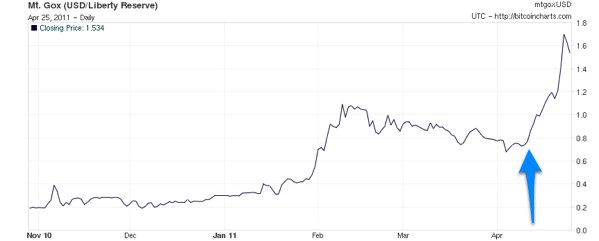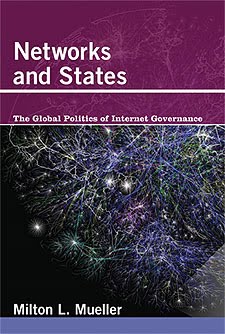Here is [a chart](http://bitcoincharts.com/charts/mtgoxUSD#rg180ztgCzm1g10zm2g25) of the Bitcoin-dollar exchange rate for the past six months. The arrow notes the date [my column on the virtual currency](http://techland.time.com/2011/04/16/online-cash-bitcoin-could-challenge-governments/) was published in TIME.com. The day after that piece was published, the Bitcoin exchange rate [reached an all time high at $1.19](http://www.bitcoinnews.com/post/4703632837/daily-2011-04-17). Yesterday, just over a week later, [it was pushing $2](http://www.bitcoinnews.com/post/4897524633/daily2011-04-24).
A wiser fella than myself once said, correlation is not causation, and no doubt my article was just a contributing factor in Bitcoin’s recent run-up. It’s simply getting increasingly mainstream attention, and with that more speculators and speculation about mainstream adoption. The chart above lends a lot of credence to Tim Lee’s [bubble critique](http://timothyblee.com/2011/04/18/the-bitcoin-bubble/), so I wanted to make sure I wasn’t giving that argument short shrift.
There may well be a Bitcoin bubble, and it may even be likely. But again, I think that misses the greater point about what Bitcoin represents. Bitcoin may be tulips and the bubble may burst, but the innovation—distributed, anonymous payments—is here to stay. Napster went bust, but its innovation presaged BitTorrent, which is here to stay. Could the Bitcoin project itself go bust? Certainly, but the innovation solving the double-spending problem I’ve been talking about, will be taken up and improved by others, just as other picked up and ran with Napster’s innovation.
I want to start thinking through the practical and legal implications of that innovation. If you don’t think the innovation could ever allow for a useful store of value, then mine is a fool’s errand. I guess I’m betting on the success of a censorship resistant currency.






 The Technology Liberation Front is the tech policy blog dedicated to keeping politicians' hands off the 'net and everything else related to technology.
The Technology Liberation Front is the tech policy blog dedicated to keeping politicians' hands off the 'net and everything else related to technology.